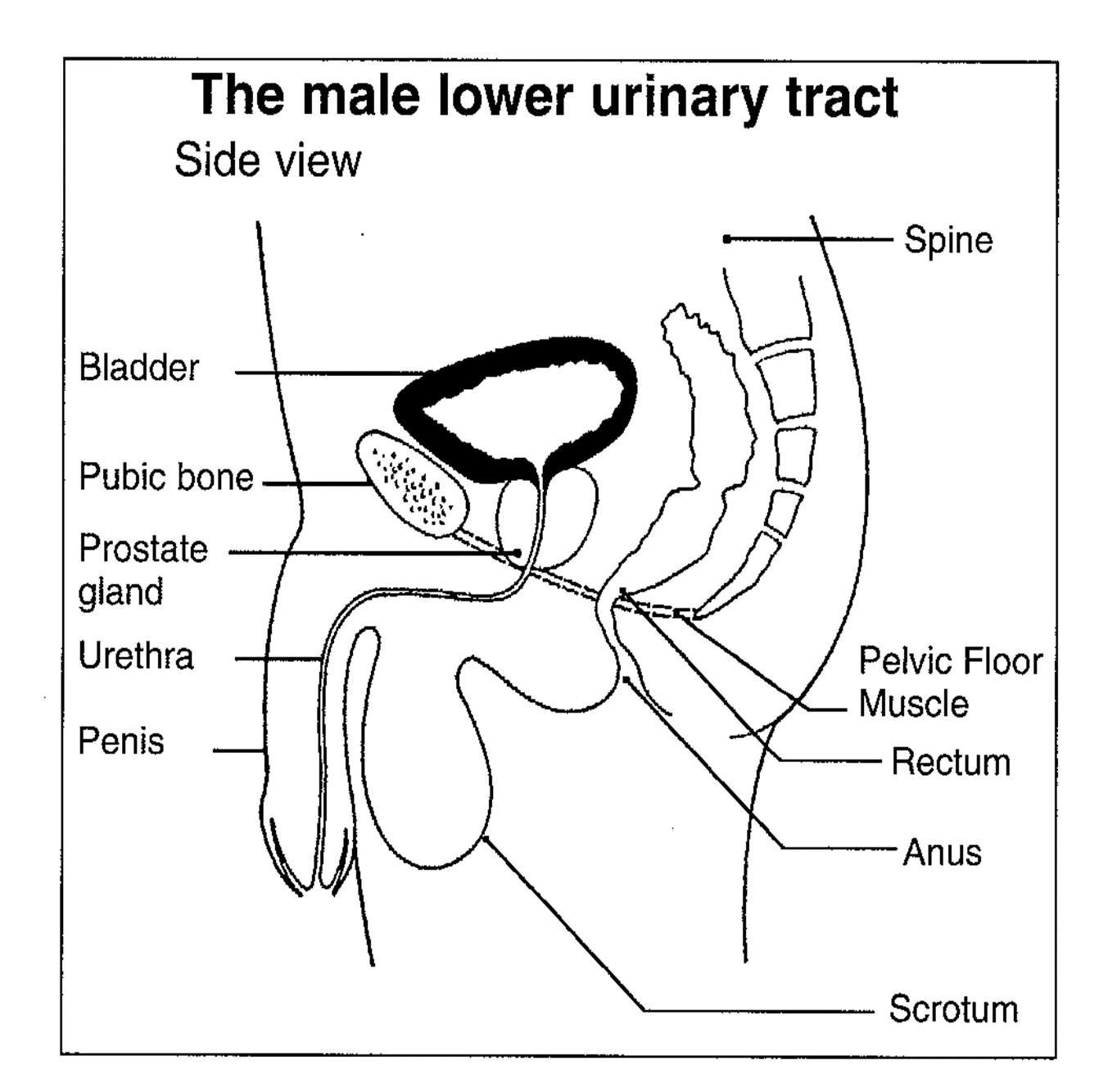Pelvic Floor Exercises for Men Undergoing Radical Prostatectomy
About
The pelvic floor muscles help to maintain urinary and bowel continence by supporting the organs of the pelvis and maintaining their position. The muscles runs between the pubic bone, (at the front of the bladder), and the base of the spine at the tail bone (see diagram).

What are the benefits of Pelvic Floor Exercises?
Performing pelvic floor exercises can minimise both urinary incontinence and impotence after your forthcoming prostate surgery.
The surgery will cause a degree of damage to the mechanism that controls the outlet of your bladder. Following the operation you will have a catheter in place for around 7-14 days, depending on the type of prostatectomy you have undergone. When it is removed there may still be some inflammation (swelling) of the tissues.
As a result you may experience some incontinence of urine. Pelvic floor exercises are designed to train the muscles that are important for continence, support and sexual activity. Pelvic floor exercises will also promote and increased blood flow to the pelvic area, helping to maintain healthy tissues and preserve normal function.
- Your nurse will discuss fluid intake with you, i.e the amount you should drink and which fluids
- Eat a healthy balanced diet to help reduce weight, or maintain your weight. Excess pounds put undue pressure or ‘stress’ on the bladder.
- Avoid Constipation
Pelvic Floor Exercises
- Lie on your back with your knees bent, and feet comfortably apart on the bed
- Tighten, (contract) your pelvic floor as if you are trying to stop wind escaping
- Hold the pelvic floor contraction as strongly as you can, 3-5 seconds increasing duration gradually as strength and stamina improves.
- Avoid holding your breath, pulling in your stomach or clenching your buttocks
Perform 3 strong contractions, lying down
- Sit on a chair with your knees apart
- Tighten, (contract) your pelvic floor as if you are trying to stop wind escaping
- Hold the pelvic floor contraction as strongly as you can, 3-5 seconds increasing duration gradually as strength and stamina improves.
- Avoid holding your breath, pulling in your stomach or clenching your buttocks
Perform 3 strong contractions, sitting
- Stand with your feet apart.
- Tighten, (contract) your pelvic floor as if you are trying to stop wind escaping
- You should see the base of your penis move in and your testicles lift
- Hold the pelvic floor contraction as strongly as you can, 3-5 seconds increasing duration gradually as strength and stamina improves.
- Avoid holding your breath, pulling in your stomach or clenching your buttocks
Perform 3 strong contractions, standing
- ….while walking – tighten the pelvic floor a little while walking
- ….after passing urine – tighten your pelvic floor as strongly as you can. This will help to squeeze the last few drops of urine from your urethra, (water pipe), before leaving the toilet.
- ….during sexual activity – tighten the pelvis floor to help keep the penis firm
Tighten your pelvic floor quickly just before and during activities such as:
- Standing from a sitting position
- Coughing
- Sneezing
- Laughing
- Shouting
- Lifting
- Bending
- Stretching
Do these exercises regularly to strengthen the pelvic floor muscles and keep them toned
Suppressing the Urge
Some men may experience the sudden, strong need to pass urine. A urine leak may be experienced directly following this strong desire to void. The best way to overcome this urge is to:
- Stay calm, (panic makes things worse)
- Sit down or stand still for 30-60 seconds until the urge disappears
- Divert your thoughts
- Do not make a sudden lunge or rush for the toilet
- Continue normal activity or visit the toilet once the urge has passed
This technique helps to challenge the bladder to hold more urine, it may help to avoid or reduce the following:
- Stay calm, (panic makes things worse)
- Caffeine, (Tea, Coffee, Cola)
- Fizzy Drinks
Infection
Sometimes this can make your bladder problems worse.
If you experience any of the following symptoms contact your GP or Specialist Nurse:
- Pain or burning whilst passing urine
- Fever or chills
- Dark, cloudy, offensive urine
- Passing small, frequent volumes
